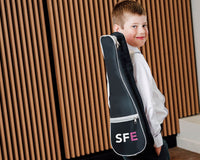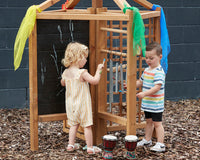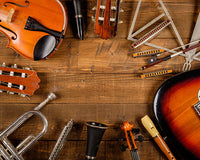
When looking for your first flute there are a lot of things to consider. The variety of makes and models can be daunting to new players, and it’s not always easy to work out which instrument will suit your needs. That’s why we've decided to put together a few tips to help make your decision easier.
-
Brand and Budget
- It is natural for many people searching for their first flute to automatically look towards the brand leaders such as Yamaha and Trevor James, and although they are still high quality instruments the cost of these brands has increased over the past few years making them an expensive choice, particularly if you’re not sure whether your child will stick at it or not.
- However, there are a number of new, budget-friendly brands that offer good quality starter flutes, including: Montreux, Jupiter and Nuvo, meaning there is almost a flute to suit every budget.
-
Straight or Curved
- Choosing a flute with a straight or curved head joint is all to do with the size of the player. A standard flute comes with a straight head joint, meaning the keys are further away from the lip plate, which can be a problem for smaller players in terms of stretching to reach for the keys and supporting the instrument.
- A possible solution for the smaller player is a curved head joint for the flute. This reduces the distance between the lip plate and the keys, resolving the problems of over-stretching and not being able to support the flute correctly.
- There are a few student models that you can buy that come with both the straight and curved head joints including Jupiter and Montreux. Purchasing a flute with both head joints can be an advantage, as it means the one instrument will last the student longer, and reduce the cost of upgrading multiple times as the student grows.
-
Metal or Plastic
- Flutes are most commonly made out of metal, often silver-plated nickel, but there is now an increasing selection of plastic flutes that rival the traditional metal ones. A plastic flute would not necessarily last a long time if the student was to play for a number of years, but they make a great option for the younger players for a number of reasons. The Nuvo student flutes are specially designed for the young beginner player as, being made of plastic, they are very light and tactile to hold. They are also water resistant, which means you can wash them out, and extremely durable - ideal for young players who may not be so careful with their instrument!
-
AIPS Scheme
- If your child is learning at school, it is also worth knowing about the AIPS or Assisted Instrumental Purchase scheme. This enables parents to purchase instruments via their school VAT free. More information about AIPS is available here.
-
Renting an Instrument
- Finally, if you’re not sure how long your child will keep playing the flute for, or if you want to try out a particular flute before you commit to buying, rental schemes are a great option. The monthly payments for rental instruments are usually low, and renting gives you the flexibility to "try before you buy", or return the instrument if the student changes their mind.
 When looking for your first flute there are a lot of things to consider. The variety of makes and models can be daunting to new players, and it’s not always easy to work out which instrument will suit your needs. That’s why we've decided to put together a few tips to help make your decision easier.
When looking for your first flute there are a lot of things to consider. The variety of makes and models can be daunting to new players, and it’s not always easy to work out which instrument will suit your needs. That’s why we've decided to put together a few tips to help make your decision easier.




















